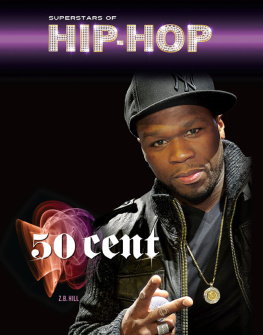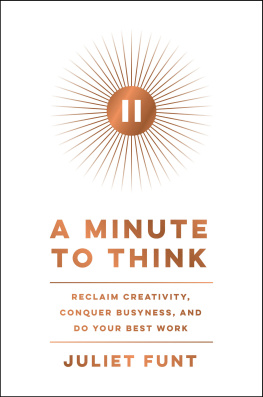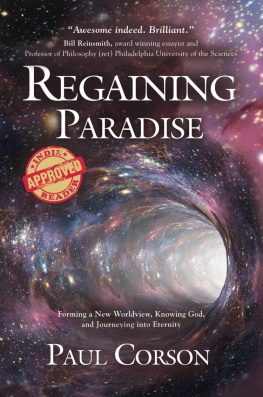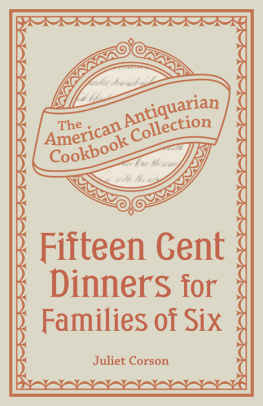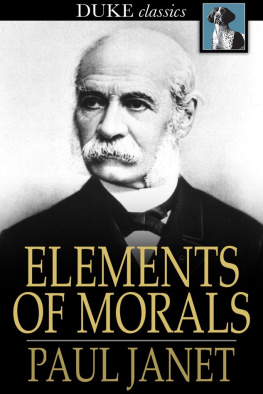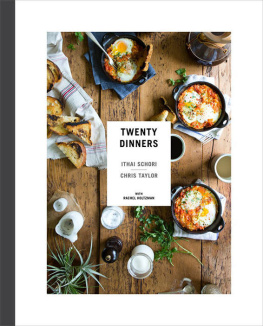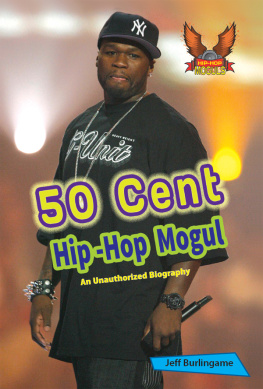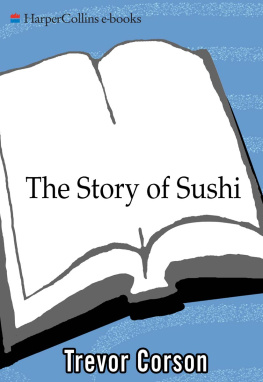Juliet Corson - Twenty-Five Cent Dinners for Families of Six
Here you can read online Juliet Corson - Twenty-Five Cent Dinners for Families of Six full text of the book (entire story) in english for free. Download pdf and epub, get meaning, cover and reviews about this ebook. year: 2011, publisher: n/a, genre: Home and family. Description of the work, (preface) as well as reviews are available. Best literature library LitArk.com created for fans of good reading and offers a wide selection of genres:
Romance novel
Science fiction
Adventure
Detective
Science
History
Home and family
Prose
Art
Politics
Computer
Non-fiction
Religion
Business
Children
Humor
Choose a favorite category and find really read worthwhile books. Enjoy immersion in the world of imagination, feel the emotions of the characters or learn something new for yourself, make an fascinating discovery.
- Book:Twenty-Five Cent Dinners for Families of Six
- Author:
- Publisher:n/a
- Genre:
- Year:2011
- Rating:5 / 5
- Favourites:Add to favourites
- Your mark:
- 100
- 1
- 2
- 3
- 4
- 5
Twenty-Five Cent Dinners for Families of Six: summary, description and annotation
We offer to read an annotation, description, summary or preface (depends on what the author of the book "Twenty-Five Cent Dinners for Families of Six" wrote himself). If you haven't found the necessary information about the book — write in the comments, we will try to find it.
Twenty-Five Cent Dinners for Families of Six — read online for free the complete book (whole text) full work
Below is the text of the book, divided by pages. System saving the place of the last page read, allows you to conveniently read the book "Twenty-Five Cent Dinners for Families of Six" online for free, without having to search again every time where you left off. Put a bookmark, and you can go to the page where you finished reading at any time.
Font size:
Interval:
Bookmark:
[Transcriber's Notes: 'Seive' and "sieve' seem to be used interchangeably by the author, they have left them as they were found on page. Hyphenation, spelling and punctuation have also been left as they are on the page. The one entry for 'W' in the index appears where it is on the page, between the 'T' and the 'V.']
Superintendent of the New York Cooking School.
AUTHOR OF "THE COOKING MANUAL,"
"OUR HOUSEHOLD COUNCIL,"
"THE BILL OF FARE, WITH ACCOMPANYING RECEIPTS AND ESTIMATED COST,"
"A TEXT-BOOK FOR COOKING SCHOOLS,"
"FIFTEEN-CENT DINNERS FOR WORKINGMEN'S FAMILIES," ETC.
THIRTEENTH EDITION, REVISED AND ENLARGED.
NEW YORK: ORANGE JUDD COMPANY,
245 BROADWAY,
1879.
Copyright by JULIET CORSON, 1878.
All Rights Reserved.
TO
During the time that this little book has been a candidate for public favor, it has attained a success far beyond the expectations of its most sanguine advocates; and in issuing this revised and enlarged edition the author returns her sincere thanks to both press and public, who have so substantially seconded her efforts for culinary reform.
In this edition an additional chapter has been devoted to the preparation of fruit for dessert, with special reference to the needs of American housewives. Most American ladies prepare fruit for table use either by canning it, or making it into rich and expensive preserves; while both of these methods are palatable, and available for winter use, the receipts given in the closing chapter will provide a welcome variety for serving fresh fruits at the table, and will tend to increase the healthy consumption of those abundant and excellent domestic productions, while they cannot fail to decrease the deplorable prevalence of that objectionable national compound, the pie.
Recent investigations concerning retail prices in different sections of the country confirm the author in the estimate of cost given in this work; in certain localities some of the articles quoted are more expensive, while others are cheaper; but the average is about equal.
TO ECONOMICAL HOUSEWIVES:
The wide publicity which the press in different sections of the country has given to my offer to show workingpeople earning a dollar and a half, or less, per day, how to get a good dinner for fifteen cents, has brought me a great many letters from those who earn more, and can consequently afford a more extended diet.
In response to their requirements I have written this book, which I hope will be found servicable in that middle department of cookery it is designed to occupy, where we begin to look for more than the absolute necessaries of life; it is a practical guide to the economical, healthful, and palatable preparation of food, and will serve to show that it is possible to live well upon a very moderate income.
It is necessary to repeat in this book some of the directions given in the work on "FIFTEEN CENT DINNERS;" but I hope their reappearance will be pardoned on the ground of their usefulness, and also because the first book will fail to reach many for whom this one is intended.
The cheapest kinds of food are sometimes the most wholesome and strengthening; but in order to obtain all their best qualities we must know how to choose them for their freshness, goodness, and suitability to our needs. That done, we must know how to cook them, so as to make savory and nutritious meals instead of tasteless or sodden messes, the eating whereof sends the man to the liquor shop for consolation.
Good food, properly cooked, gives us good blood, sound bones, healthy brains, strong nerves, and firm flesh, to say nothing of good tempers and kind hearts. These are surely worth a little trouble to secure.
The first food of nearly all living creatures is milk, the only entire natural food; that is, the only food upon which health and strength can be sustained for any length of time, without using any other nourishment. For this reason it is the best food you can give the children if you must restrict their diet at all; and it is also a valuable addition to the food of grown persons. While this fact about milk is settled, it is generally acknowledged by people who study the subject that we thrive best on a variety. We get warmth and strength from fat meat, wheat, rye, barley, rice, milk, sugar, fruit, peas, beans, lentils, macaroni, and the roots of vegetables; we gain flesh from lean meat, unbolted flour, oatmeal, eggs, cheese, and green vegetables; and, if we want to think clearly, we must use fish, poultry, the different grains, and a good variety of fruit and vegetables.
The food most generally in use among the masses is just that which meets their requirements. No hungry man will spend money for what he knows will not satisfy his appetite, and a natural appetite may always be trusted. For that reason the receipts given in this book treat of the articles in common use, with the exception of lentils and macaroni, which are foods that I earnestly beg all to try. In meals made up of bacon, potatoes and bread, of corned beef and cabbage, and of pork and beans, there exists an equal and sufficient amount of nourishment; but if other dishes are added to these, the variety will result in better general health and contentment. If we were to live day after day on rice, bread, potatoes, or any one other article of food, we would not long be strong enough for any kind of work. In matters of diet variety is not only the spice of life, it is the necessity.
In estimating cost, I have naturally supposed that the family consists of father, mother, and children of different ages, and not of six adults; for them the quantities given would, of course, be insufficient. I allow a meat dinner every day; but in order to have this the meat itself must generally be used one day, with bread or vegetables, and the next day the breakfast must be the broth or juice of the meat, which, if prepared according to my directions, will afford equal nourishment.
I wish to call your attention to the following important fact. The hardy and thrifty working classes of France, the country where the most rigid economy in regard to food is practised, never use tea or coffee for breakfast, and seldom use milk. Their food and drink is BROTH. Not the broth from fresh meat, for they do not often eat that; but that which is made from vegetables, and perhaps a bit of bacon or salt pork.
If you will reflect on the reasons I give in the next chapter for boiling food, instead of roasting or baking it, you will learn two important lessons in economy, namely: that boiling saves at least one fourth the volume of food, and that the broth which is produced, when properly managed, always gives the foundation for another meal. You should always bear in mind that the object of cooking is to soften and disintegrate food, so that it can be easily masticated; and to expand it, so as to present a large surface to the action of the digestive organs. In this connection you must open your eyes to certain physiological facts if you want your food to agree with you. I shall not tell you more, and perhaps not so much, as you ought to know, and to teach your children.
In calculating the cost of the receipts I give you, I have used the retail prices asked in Washington market, and in ordinary grocery stores, at this season of the year; the average is about the same as that of past years, and probably will not change much; so that I believe I have not placed too low an estimate upon them.
At the first glance it may seem impossible to buy healthy meat at the prices I give, but you must remember that I speak of the good second quality of meat, and that the marketing must be done with economy, and in low-priced localities. It can be done, for I have done it myself. Go to packing houses, and provision stores, for meats; to German green-groceries for vegetables, and fruit; and to "speciality" stores, for butter, sugar, tea, et cetera.
Next pageFont size:
Interval:
Bookmark:
Similar books «Twenty-Five Cent Dinners for Families of Six»
Look at similar books to Twenty-Five Cent Dinners for Families of Six. We have selected literature similar in name and meaning in the hope of providing readers with more options to find new, interesting, not yet read works.
Discussion, reviews of the book Twenty-Five Cent Dinners for Families of Six and just readers' own opinions. Leave your comments, write what you think about the work, its meaning or the main characters. Specify what exactly you liked and what you didn't like, and why you think so.

